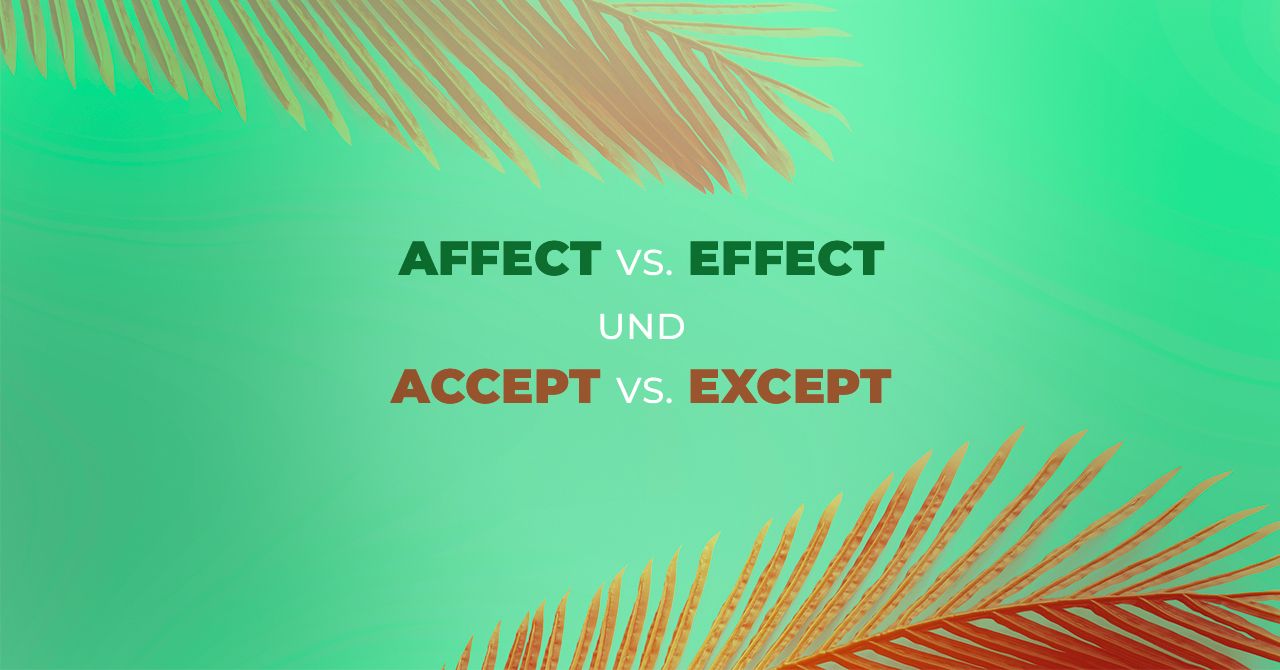
„Affect“ vs. „Effect“ und „Accept“ vs. „Except“. Gleicher Klang – andere Bedeutung
„Affect“ bedeutet etwas zu beeinflussen, oder sich auf etwas auszuwirken. Wenn „effect“ als Verb vorkommt, dann wird es eingesetzt, wenn etwas hervorgerufen wird.
„Affect“ vs. „Effect“: Wie erkennt man den Unterschied?
Selbst Menschen, deren Muttersprache Englisch ist, verwechseln diese beiden Wörter oft.
„Affect“ auf Deutsch
„Affect“ bedeutet etwas zu beeinflussen, oder sich auf etwas auszuwirken. Typischerweise wird es als Verb verwendet.
Beispiele, bei denen „Affect“ verwendet wird:
How will eating the entire cake affect my body?
The spectators were visibly affected by the performance on display.
Having positive role models can affect the trajectory of your life.
Ausnahme:
„Affect“ wird eigentlich immer als Verb verwendet, jedoch gibt es im Englischen auch das Nomen „affect“.
In der Psychologie wird mit „affect“ ein Gefühl oder eine subjektive Erfahrung bezeichnet, welche als Begleitung einer Handlung, oder als Reaktion auf einen Reiz auftritt.
„Effect“ auf Deutsch
Im Gegensatz zu „affect“, kommt „effect“ meistens als Substantiv (Nomen) vor und nur sehr selten als Verb.
Als Substantiv hat es die gleiche Bedeutung wie das deutsche Wort Effekt. Wenn „effect“ als Verb vorkommt, dann wird es eingesetzt, wenn etwas hervorgerufen wird.
Beispiele für „Effect“ als Substantiv (Nomen):
What do you think the effect of all this pollution will be on the environment?
His promotion had a large effect on the entire leadership of the company.
A good diet can have positive effects on your body and mind.
Ausnahmen: Beispiele für „effect“ als Verb:
The rioters wanted to effect change on the political system of the nation.
The new government effected many societal changes.
The new curriculum effected the desired improvements within just 3 months.
Hinweis
Auch wenn „effect“ und „affect“ im Englischen sowohl als Nomen als auch als Verb verwendet werden können, liegt man meistens richtig, wenn man einfach „effect“ einsetzt, wenn ein Nomen fällig ist und „affect“ wenn ein Verb gebraucht wird.
„Accept“ vs. „Except“: Was ist der Unterschied?
Ähnlich wie bei „effect“ und „affect“ handelt es sich bei „accept“ und „except“ um Wörter, die im Englischen gleich klingen, jedoch eine andere Bedeutung haben. Im Gegensatz zu „affect“ und „effect“ ist der Unterschied zwischen „accept“ und „except“ aber viel klarer.
„Accept“:
Im Englischen wird „accept“ dann verwendet, wenn etwas entweder akzeptiert wird oder wenn etwas erhalten wird.
Beispiele für „Accept“ als Akzeptanz:
Maria should accept the repercussions of her actions.
Although it is difficult, sometimes we must accept change as a natural part of growing up.
Even though it was difficult to believe at first, she later accepted it as true.
Beispiele für „Accept“ als Annahme:
She accepted the parcel that the delivery man delivered to her address.
He accepted the invitation to the event later that week.
He accepted the new job offer as soon as the benefits were made clear to him.
„Except“:
„Except“ wird dann eingesetzt, wenn etwas ausgeschlossen wird. „Except“ wird entweder als Präposition, als Verb, oder als Konjunktion (Bindewort) eingesetzt.
Beispiele für „Except“ als Präposition:
Everybody in the class was invited to the party except for George.
There was nothing left in the fridge except for a can of old milk.
She got along with nobody except for Tom.
Beispiele für „Except“ als Verb:
He excepted certain clauses in the contract.
Everybody attended the gathering – children excepted.
Beispiele für „Except“ als Konjunktion:
Employees are not allowed to leave their workstations except for a few select circumstances.
He did not leave the house except to go grocery shopping.
They do nothing except complaint.


















